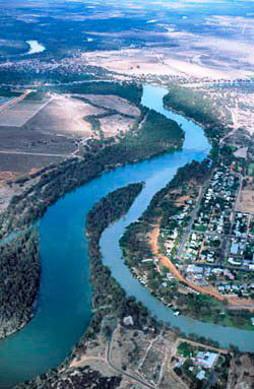Posted 11 March 2010

Murray-Darling junction. Photo: Andrew Tatnell (source: www.environment.gov.au)
The forthcoming Murray-Darling Basin Plan is a once-in-a-life time opportunity to restore the ailing river system, more than 30 of Australia's leading freshwater scientists say in a statement today.
"We really have to get this right," says a spokesman for the group, Professor Richard Kingsford, Director of the Australian Wetlands and Rivers Centre, University of NSW. "We owe it to the Australian people and to the Basin's environment."
The signatories to the statement, representing Australia's top experts in the field, express cautious support for the draft Basin Plan to be released by the Federal Government in the next few months. They note that the plan will provide the overarching direction for managing the Basin's rivers and for sustainable levels of water diversion. This will be done by identifying key environmental assets and determining their water needs.
But the scientists identify nine points they believe will need to be addressed for the plan to fulfil its potential. These include an acknowledgement that the system cannot be seen as a series of isolated sites for management of water.
"Rivers and their floodplains are ecosystems connected by flow," says Adjunct Associate Professor Keith Walker of the School of Earth and Environmental Sciences at The University of Adelaide. "Flowing water transports sediment, salt and nutrients, and connects the habitats of all plant and animals. Without adequate flow, the system would collapse."
The scientists note that many of the Basin's rivers have continued to degrade because of over-allocation and drought. This is especially true of the wetlands protected by international conventions - the Ramsar Sites.
"Australia has international responsibilities for maintaining the ecological character of the Ramsar wetlands in the Basin yet most of them are in decline," says Professor Max Finlayson, Director of the Institute for Land, Water and Society, Charles Sturt University. "The Basin Plan is a significant opportunity to tackle this major issue and reverse the neglect of the past."
Over-allocation through the management of diversion limits will be one of the more critical issues to be addressed. "We know the rivers are considerably over-allocated, so further limits on diversions are essential," says Professor Kingsford. "But these can be delivered in many ways, such as sustainable diversion limits, end-of-system targets and management of low flows."
The statement also calls for common terminology that transcends State borders and allows people to better understand how the Basin's water is managed.
It also argues that it is critical to review and record uncertainties involved in the development of the Basin Plan, not only because developing such a major undertaking needed to be done quickly but also to enable the assumptions and calculations underpinning its findings on hydrology, ecology and socioeconomics to be revised in the light of new knowledge in the future.
The scientists acknowledge that the plan will not be able to manage all aspects of rivers, since external factors such as levee banks and agricultural practices can affect floodplain flows and water quality.
Finally the scientists are asking Government's to invest in future leaders through scholarships and investment in teaching and research: "There has never been a time when water has been more important as an issue for society and the environment," says Professor Kingsford. "We need to be constantly learning and thinking about innovative ways of managing our rivers and our future generations need a leg-up to make this happen."
The full statement can be viewed here: http://www.wetrivers.unsw.edu.au/
Media contacts:
Professor Richard Kingsford: Mobile 0419 634 215 richard.kingsford@unsw.edu.au
UNSW Faculty of Science: Bob Beale 0411 705 435 bbeale@unsw.edu.au

Professor Andy Baker features in American Water Resources Association ‘Water Resources Impact’, September 2020 edition.

The Connected Waters Initiative (CWI) is pleased to welcome Taylor Coyne to its network as a postgraduate researcher. If you’re engaged in research at a postgraduate level, and you’re interested in joining the CWI network, get in touch! The CWI network includes multidisciplinary researchers across the Schools of Engineering, Sciences, Humanities and Languages and Law.

The Grand Challenge on Rapid Urbanisation will establish Think Deep Australia, led by Dr Marilu Melo Zurita, to explore how we can use our urban underground spaces for community benefit.

On the 21 August 2020, CWI researchers made a submission to the National Water Reform Inquiry, identifying priority areas and making a number of recommendations as to how to achieve a sustainable groundwater future for Australia.

Results published from a research project between the Land Development Department (LDD) Thailand and UNSW has demonstrated how 2-dimensional mapping can be used to understand soil salinity adjacent to a earthen canal in north east Thailand (Khongnawang et al. 2020).